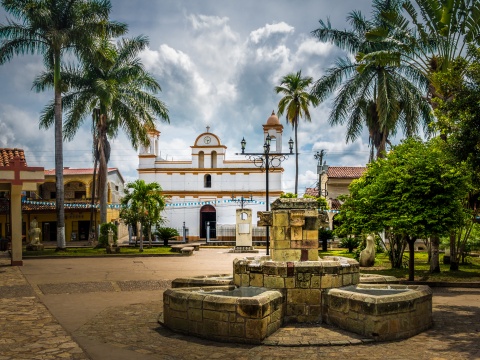Everybody remembers Mexico, and everybody remembers Panama-but the small countries between these two well-known places can often slip through the cracks. For savvy business owners, Honduras offers a wealth of opportunities. For starters, the country scored 545 on the EF English Proficiency Index in 2024 (68 points above the global average) and ranks 33rd out of 116 countries worldwide.
Major Honduran hiring hubs like San Pedro Sula and Tegucigalpa score even higher at 567 and 563, respectively. These professionals understand U.S. business culture and work in time zones that align perfectly with North American operations. They're bilingual, adaptable, and ready for remote work at a scale that surprises even veteran recruiters.
With a labor force of over 4 million people, the talent pool runs deep across tech, customer service, finance, and digital marketing.
The business case gets stronger when you look at the numbers. Companies report cost savings between 30% and 40% compared to hiring in North America. Major BPO operators like Alorica, Startek, and Sitel have already established operations there. Hiring in Honduras isn't about finding the cheapest option; it's about discovering a workforce that delivers quality, stability, and real growth potential for distributed teams.
The labor market in Honduras
This is a workforce in its prime working years. The median age sits at 29.6, and nearly 57% of the population falls between the ages of 20 and 64.
The economy tells a story of transformation. Services now dominate employment at 56% of the total workforce, up significantly from a decade ago when agriculture led. This category includes the tech sector, BPO operations, customer support, and digital services. The shift reflects where the country's professional energy is flowing.
The tech ecosystem itself keeps expanding. San Pedro Sula has emerged as a technological hub where software development firms and remote teams cluster. Major companies have already proven the model works at scale. For companies building decentralized workforces, this means access to professionals who understand distributed workflows, communicate effectively across time zones, and bring both technical capability and cultural alignment to their roles.
Universities are feeding this pipeline. Honduras's largest private university, UNITEC, enrolls over 17,000 students across campuses in Tegucigalpa, San Pedro Sula, and La Ceiba. The institution offers degrees in computer systems engineering, data science and artificial intelligence, telecommunications, and information technology. Students graduate with technical foundations in software development, systems architecture, and emerging technologies. Other institutions contribute their own graduates each year.
How to hire employees in Honduras
You have two paths forward when hiring in Honduras. Each comes with its own timeline, cost structure, and level of complexity. The right choice depends on how quickly you need to move and how deep your commitment to the market runs.
Establishing a legal entity locally
This is the traditional route. You establish a legal presence in Honduras by registering a subsidiary or branch office. The process involves navigating corporate registration, securing tax identification numbers, opening local bank accounts, and setting up payroll systems that comply with Honduran labor law.
This typically takes months. You need local legal counsel to handle the paperwork, accountants who understand the tax code, and you become responsible for tracking every regulation, statutory contribution, and change to labor law.
The upside is control. You own the entity, so you manage everything directly. For companies planning significant long-term operations with dozens of employees, this investment pays off. But for smaller teams or companies testing the market, it can feel like building a house when you just need a place to stay for the weekend.
Partnering with an employer of record
This flips the model. The employer of record (EOR) becomes the legal employer of your team members in Honduras while those employees work exclusively for you. This lets you skip entity setup entirely and avoid the legal and administrative burdens. The EOR handles employment contracts, payroll, tax withholding, social security contributions, and benefits administration.
As you might expect, this is the much faster option. Companies can onboard employees in as little as 24 hours instead of waiting months. The EOR ensures compliance with the Honduran Labor Code, manages statutory benefits, and stays current on regulatory changes. All you do is pay a monthly fee per employee, and in return, you get to focus on managing your team rather than navigating foreign employment law.
This model works especially well for companies hiring their first employees in Honduras or building distributed teams across multiple countries. Platforms like Pebl provide this service at scale. The trade-off is less direct control over certain HR processes, but for most companies, that trade-off is worth the speed and simplicity.
Navigating employment contracts
Employment contracts in Honduras can be verbal or written, but if there's ever a dispute and you don't have a written contract, the law presumes the employee's version of events is true. That alone makes written contracts the obvious choice. Most companies dealing with professional roles put everything in writing from day one.
The Honduran Labor Code requires contracts to include specific details. Full names and identification of both parties. Start date and job description. Work location and hours. Salary amount, payment method, and frequency.
Contracts must specify whether the arrangement is indefinite, fixed term, or for a specific project. The law favors indefinite term contracts, so if a fixed term contract doesn't meet legal requirements or if an employee keeps working after the stated end date, it automatically converts to indefinite.
Written contracts must be signed in triplicate. One copy goes to the employer, one to the employee, and one gets registered with the Ministry of Labor. This registration requirement catches some companies off guard. It matters for compliance and becomes especially important if employment disputes arise later.
Honduran working hours, holidays, and leave
Standard working hours in Honduras max out at 8 hours per day and 44 hours per week. Night shift workers cannot exceed 36 hours weekly. Mixed day and night shifts top out at 42 hours per week. These limits are strict. Anything beyond them counts as overtime and must be compensated at higher rates.
Vacation entitlement scales with tenure. It starts modest and builds over time:
- After 1 year: 10 working days
- After 2 years: 12 working days
- After 3 years: 15 working days
- After 4+ years: 20 working days
Employers must grant a vacation within three months of the employee becoming eligible. Vacation pay is calculated based on the employee's average salary over the six months before taking leave.
Honduras recognizes 10 national public holidays, including New Year's Day, Holy Week, Labor Day, Independence Day, and Christmas. Employees also get five consecutive days of paid marriage leave and time off for serious family emergencies or union duties.
Employee benefits and social contributions
Both employers and employees contribute to Honduras's social security system through the Instituto Hondureño de Seguridad Social, known as IHSS. These contributions fund health care, disability coverage, pension benefits, and other social programs. The system operates on mandated contribution rates calculated as percentages of employee salaries up to specific monthly ceilings.
Here's how the contributions break down:
- IHSS Health/Maternity. Employer pays 3.0%, employee pays 2.5%
- IHSS Disability/Old Age/Death. Employer pays 4.0%, employee pays 2.5%
- RAP (Complementary Pension). Employer pays 1.5%, employee pays 1.5%
- INFOP (Vocational Training). Employer pays 1.0%, no employee contribution
The maximum monthly salary ceiling for IHSS contributions sits at HNL 11,903 (US$454). For RAP contributions, the ceiling is HNL 9,382.40. INFOP has no salary ceiling. Employers must register with these institutions and remit monthly payments based on total payroll. Payments are due by the 10th business day of each month following the pay period.
Beyond statutory contributions, employees receive a mandatory 13th-month salary payment in December as a Christmas bonus and a 14th-month payment in July. Each payment equals one month's salary. These aren't optional perks. They're legally required components of total compensation.
Payroll and taxation in Honduras
Honduras uses a progressive income tax system for individuals with rates ranging from 0% to 25%. The tax brackets get adjusted annually based on inflation. For 2025, the system exempts annual income up to HNL 217,493 (US$8,301). Income above that threshold faces progressively higher rates. 15% on the next tier, 20% on the middle tier, and 25% on the highest tier.
Employers withhold income tax from employee paychecks throughout the year. The withholding mechanism ensures taxes get collected consistently rather than in a single annual payment. Individuals living in Honduras for more than three months are considered residents and must pay income tax on their earnings. The tax year aligns with the calendar year, running from January 1 through December 31.
Payroll in Honduras typically runs monthly. Employers must calculate gross wages, apply all required deductions for income tax and social contributions, and ensure net pay reaches employees on schedule. Total employer payroll obligations generally add about 16.6% on top of base salary when accounting for all statutory contributions. Employee-side deductions typically run around 8.1% of gross wages. Companies must maintain accurate payroll records and file required reports with tax authorities and social security institutions according to specific deadlines tied to their tax identification numbers.
Employee vs. contractor classification
The line between employee and contractor matters in Honduras. Get it wrong and the penalties stack up fast. Authorities look at the actual working relationship, not just what the contract says, so if it walks like employment and talks like employment, they'll treat it as employment.
Honduras evaluates several factors to determine classification. Does the company control how and when work gets done? Does the worker use company tools and equipment? Is this person economically dependent on one client? Can they work for multiple companies at once?
The more control a company exercises, the more it looks like employment. True contractors set their own schedules, use their own resources, and serve multiple clients.
Misclassification triggers serious consequences. Companies face back payment of all wages and benefits the person should have received as an employee. Social security contributions get calculated retroactively with penalties and surcharges added on top. The worker can file claims for unpaid vacation, severance, and other statutory rights. Almost half (46%) of Honduras's workforce operates as independent contractors, so the talent pool is deep. Classification requires careful assessment upfront rather than expensive corrections later.
Termination and severance in Honduras
Ending an employment relationship in Honduras requires following specific procedures and notice requirements. According to Fernando Zelaya and Stefano Rojas, associates at Ulloa & Asociados, an experienced law firm in Honduras, "the notice period depends on the worker's tenure with the employer," with the required notices ranging from:
- 24 hours if the worker has been employed for less than three months
- One week if the worker has been employed for three to six months
- Two weeks if the worker has been employed for six months to one year
- One month if the worker has been employed for one to two years
- Two months if the worker has been employed for more than two years
The law distinguishes between termination with and without cause. Each has different requirements and financial implications. Getting this wrong exposes companies to wrongful termination claims.
Termination without cause means the employer must provide notice and pay severance. The severance calculation depends on the length of service and typically equals one month of salary for each year worked. Employees with less than one year receive a prorated amount. The notice period also scales with tenure. These payments are mandatory, not negotiable.
Termination with cause requires documented justification under the Labor Code. Valid reasons include serious misconduct, repeated violations of work rules, or abandonment of position. Even with cause, employers must follow proper procedures, including written warnings and documentation. Employees can challenge terminations they believe are unjustified. Labor courts tend to favor workers in disputes, which makes thorough documentation essential from day one.
Honduras work permits and immigration
Foreign nationals need proper authorization to work legally in Honduras. The process involves obtaining both a work permit and a temporary residence permit. These permits tie directly to the employment contract. No contract means no legal basis for the permits.
The work permit application requires several documents:
- Valid passport with at least six months of remaining validity
- Employment contract registered with the Ministry of Labor
- Police clearance certificate from the applicant's home country
- Health certificate issued by a Honduran medical facility
- Proof of professional qualifications or credentials relevant to the position
Processing times vary but typically take several weeks to several months. Companies should initiate the permit process well before the intended start date. The temporary residence permit remains valid as long as the employment relationship continues.
If employment ends, the permit status changes accordingly. Employers sponsoring foreign workers bear responsibility for ensuring permit compliance throughout the employment period. Working without proper work authorization creates liability for both the employee and the sponsoring company.
FAQs
Here are answers to some of the most common questions companies ask when considering hiring in Honduras. These cover the practical realities and cultural dynamics worth understanding before you start building a team.
What is the work culture in Honduras?
Honduran work culture emphasizes hierarchy and respect for authority, with decisions typically flowing from the top down. Communication tends to be more indirect than in Western cultures, with strong emphasis placed on building personal relationships before diving into business matters. Patience matters here; negotiations take time, face-to-face interactions are valued, and trust forms the foundation of professional relationships.
What is a good salary in Honduras?
Salaries are significantly lower than in North America or Europe, which is part of why companies report substantial cost savings when hiring in Honduras. A competitive salary depends heavily on the role, industry, and experience level. Still, professional positions in tech, finance, and customer service typically pay enough to attract strong talent while remaining cost-effective for employers. Individuals in the formal sector typically make around HNL 13,102 (US$500) while the average living wage is about half that, hovering around HNL 6,852 per month (US$277).
Can I hire in Honduras without a local business entity?
Yes, by using an employer of record. The EOR becomes the legal employer while your team members work exclusively for you, eliminating the need to establish a subsidiary or branch office. This approach lets you onboard employees in days instead of months and skip the administrative and financial burden of entity setup entirely.
What is the minimum wage in Honduras?
In 2025, Honduras set the minimum wage at HNL 37.72 (US$1.44) per hour, or HNL 9,053.43 (US$345) per month, for workers in agriculture, forestry, hunting, and fishing. However, minimum wage requirements are higher and vary widely across different industries.. Most professional roles in tech, BPO, and knowledge work pay well above minimum wage, reflecting the skill levels and market competition for qualified talent in those fields.
How Pebl helps hire in Honduras
So you want to take advantage of Honduras's young and skilled workforce, but local entity setup doesn't sound like the right choice? Partner with Pebl to simplify everything.
Our Employer of Record service operates in Honduras and in 185+ countries worldwide, handling the full employment lifecycle from compliant contracts to local payroll and benefits. We become the legal employer while your team members work exclusively for you. If you want to skip months of entity setup, avoid compliance headaches, and start onboarding talent in days instead of quarters, book a demo to learn more.
Disclaimer: This information does not, and is not intended to, constitute legal or tax advice and is for general informational purposes only. The intent of this document is solely to provide general and preliminary information for private use. Do not rely on it as an alternative to legal, financial, taxation, or accountancy advice from an appropriately qualified professional. The content in this guide is provided "as is," and no representations are made that the content is error-free.
© 2025 Pebl, LLC. All rights reserved.
Topic:
Country Guides


